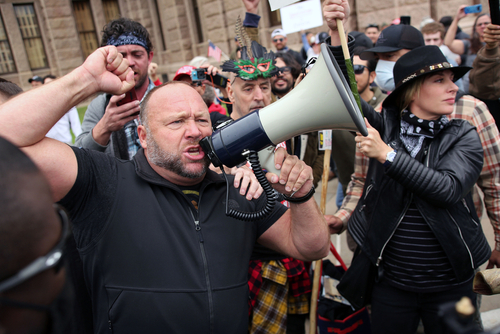Alex Jones’s scorched-earth attack on his own conservative peers exposes a bitter feud that could reshape the far-right media landscape—and the fallout is just beginning.
Alex Jones’s Public Attack: Catalyst for Conservative Media Conflict
Early October 2025, Alex Jones, host of The Alex Jones Show and founder of Infowars, ignited a firestorm by calling out Bondi, Patel, and Bongino on-air and on social media. His rhetoric—branding Bondi “lazy,” Patel “compromised,” and Bongino a “big baby”—was not just provocative, it was strikingly personal and direct. Jones’s broadcast and subsequent online posts triggered immediate responses from the targeted figures, fueling heated debate among conservative audiences. The incident marks a significant departure from the usual ideological sparring, shifting the spotlight to character and integrity within the movement.
Alex Jones: "Bongino should stop worrying about his PR and how he looks and worry more about the future of the country and put it all on the line instead of being a hothead…But Patel and Bondi, these are just TV heads — these are just people that are here to be celebrities." pic.twitter.com/4VCUdd7rPQ
— Republican Accountability (@AccountableGOP) October 14, 2025
Jones’s remarks circulated rapidly through alternative media outlets and social platforms. By October 13–15, 2025, supporters and detractors were vocal, with some defending Jones’s candor and others decrying the divisiveness. This episode reflects a broader pattern in far-right media, where public feuds often mirror underlying strategic and personal rivalries. Previous collaborations and alliances have become fraught, with Jones’s credibility and influence increasingly challenged by legal setbacks and bans from mainstream platforms.
Roots of Division: History and Power Dynamics
Alex Jones’s role as a provocateur dates back to the late 1990s with the founding of Infowars. His influence peaked during the Trump presidency, leveraging his conspiracy-driven commentary to build a massive following. However, Jones’s empire has faced significant blows, most notably a $1.5 billion defamation judgment related to Sandy Hook, along with widespread deplatforming. This context shapes his current posture: embattled, combative, and eager to maintain relevance in a crowded conservative media space. Bondi, Patel, and Bongino—each with their own brands and loyal audiences—have increasingly operated independently, making competition for influence inevitable.
The relationships among these personalities are characterized by shifting alliances and rivalries. While Jones once commanded outsized sway, his diminishing reach has emboldened others to challenge his authority. Bondi, Patel, and Bongino’s responses to Jones’s attacks vary; some dismiss the criticism, others defend their records, but all seek to preserve their credibility and audience trust. For Jones, the feud is both a strategic gambit and a reflection of personal grievances, revealing the precarious balance of power within the movement.
Feud Fallout: Impact on Audiences and the Movement
The immediate effect of Jones’s tirade is heightened polarization and infighting among far-right media personalities. Audience reactions are split—some rally behind Jones’s uncompromising stance, while others express dismay at the public spectacle. The story’s amplification by alternative media and social platforms ensures that the fallout will not be contained to the principals involved. Economic implications loom as well, with potential shifts in donations, merchandise sales, and advertising revenue tied to audience allegiance.
Alex Jones: "[Pam] Bondi's not bad, she's just lazy. [Dan] Bongino is emotional and a big baby. [Kash] Patel is compromised and it's just so sad." pic.twitter.com/Od5kFu9r1i
— Republican Accountability (@AccountableGOP) October 14, 2025
Longer-term, the feud may prompt a realignment of influence and audience loyalty within the conservative media ecosystem. If Jones’s credibility continues to erode, he risks further isolation, while Bondi, Patel, and Bongino could consolidate their positions. The incident also underscores the volatility and fragmentation of the alternative media sector, suggesting that similar conflicts may arise as competition intensifies. For movement organizers, the lack of unity and coordinated messaging could weaken mobilization efforts ahead of the 2026 election cycle.
Expert Analysis: Motives, Risks, and the Road Ahead
Media analysts attribute Jones’s aggressive posture to desperation amid declining influence and mounting legal pressure. Scholars of political communication highlight the dangers of intra-movement conflict, warning that public feuds sow confusion and undermine mobilization. Some commentators interpret Jones’s attacks as a genuine attempt to police movement integrity, while others see them as self-serving or evidence of personal grievances. Mainstream academic and journalistic sources consistently regard Jones’s credibility as compromised, citing his history of misinformation and legal defeats.
The motivations behind Jones’s tirade remain partly speculative, with only partial statements available from all stakeholders. What is clear is that the feud’s outcome will hinge on subsequent responses and the ability of each figure to either reconcile or escalate the conflict. The stakes are high—not just for Jones, Bondi, Patel, and Bongino, but for the broader right-wing media sphere navigating a period of profound uncertainty and change.

